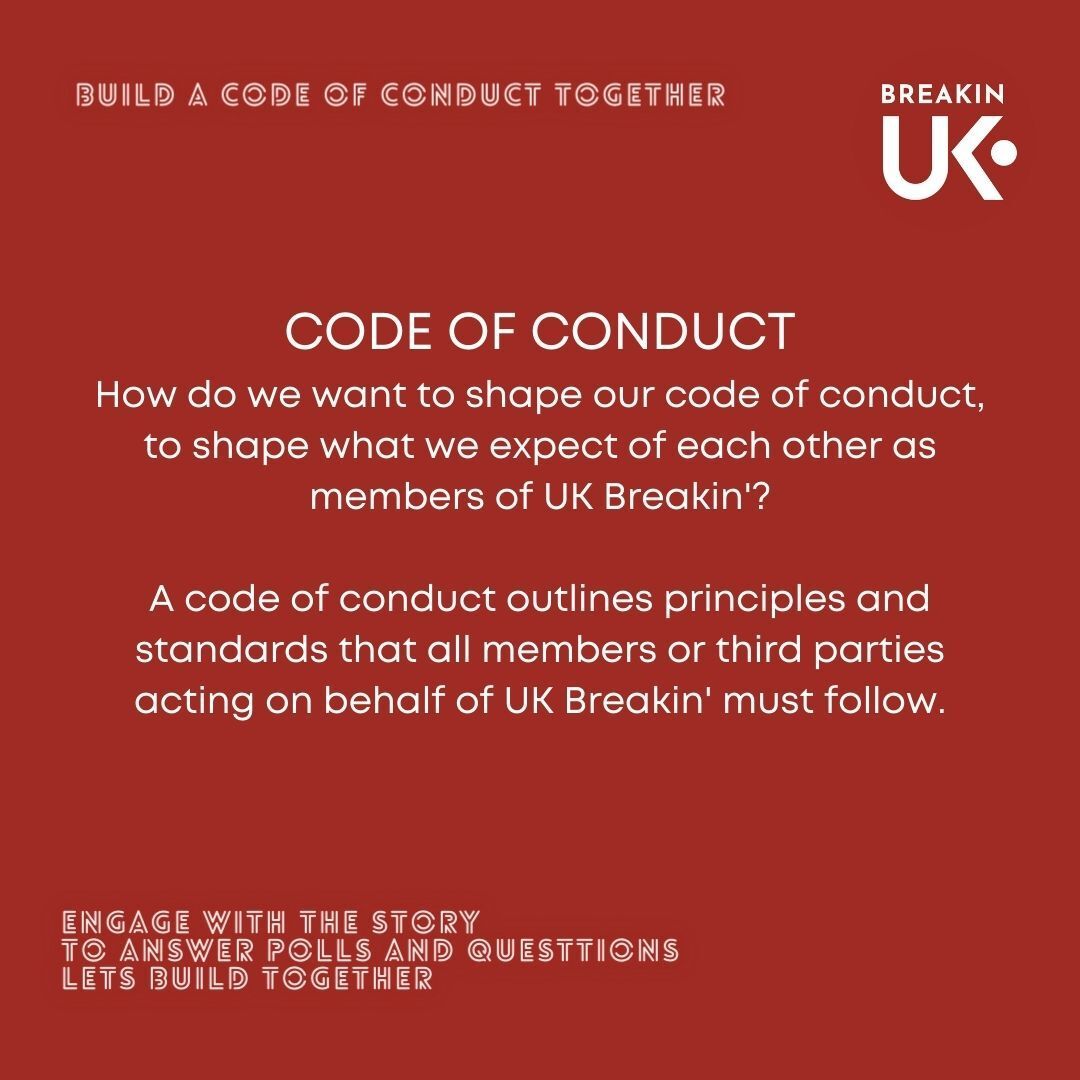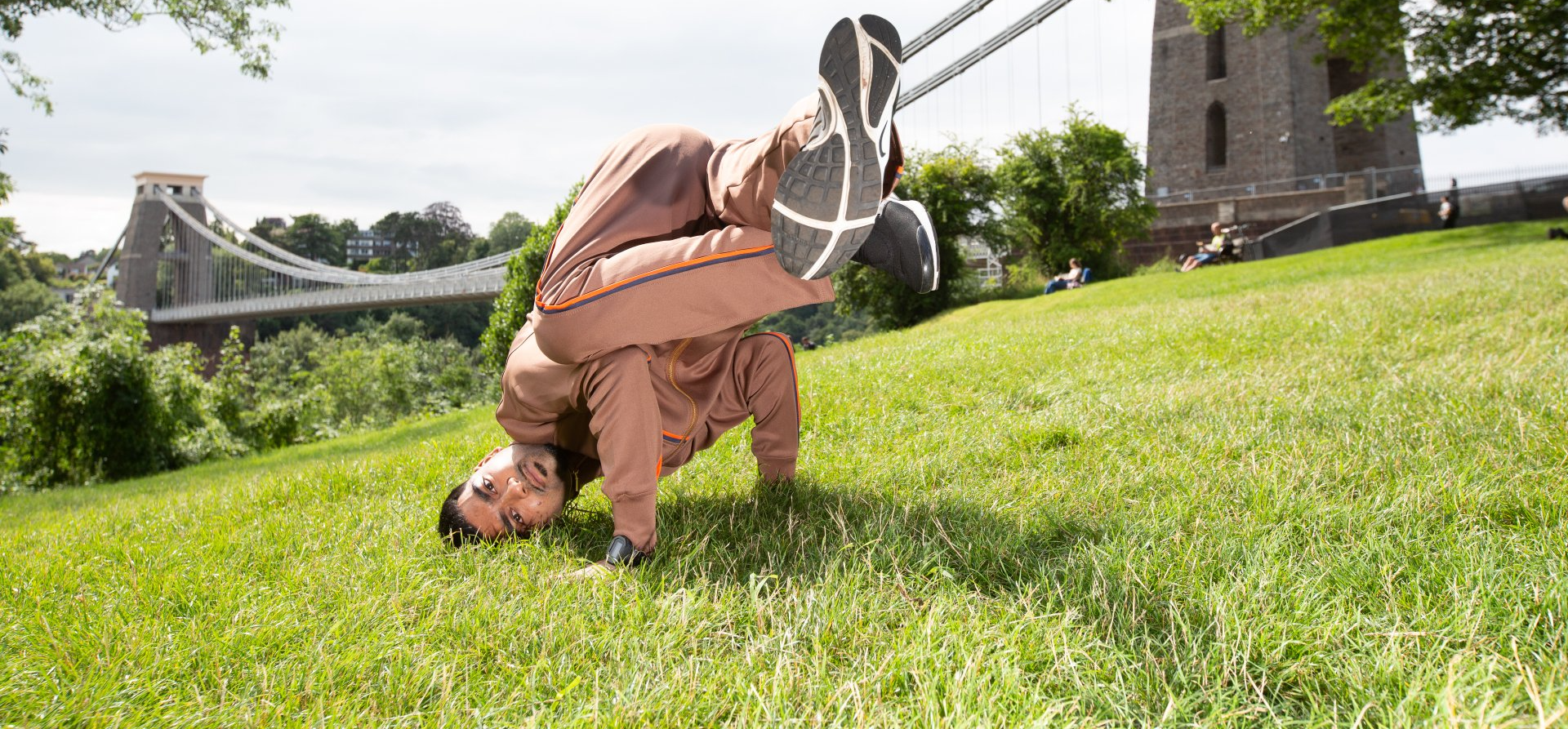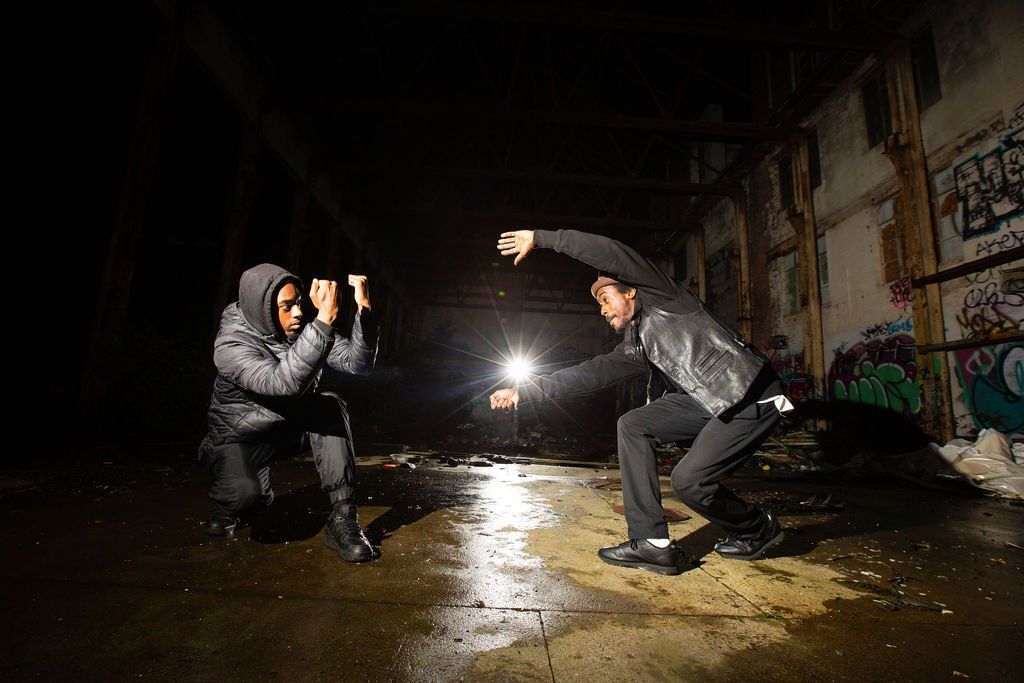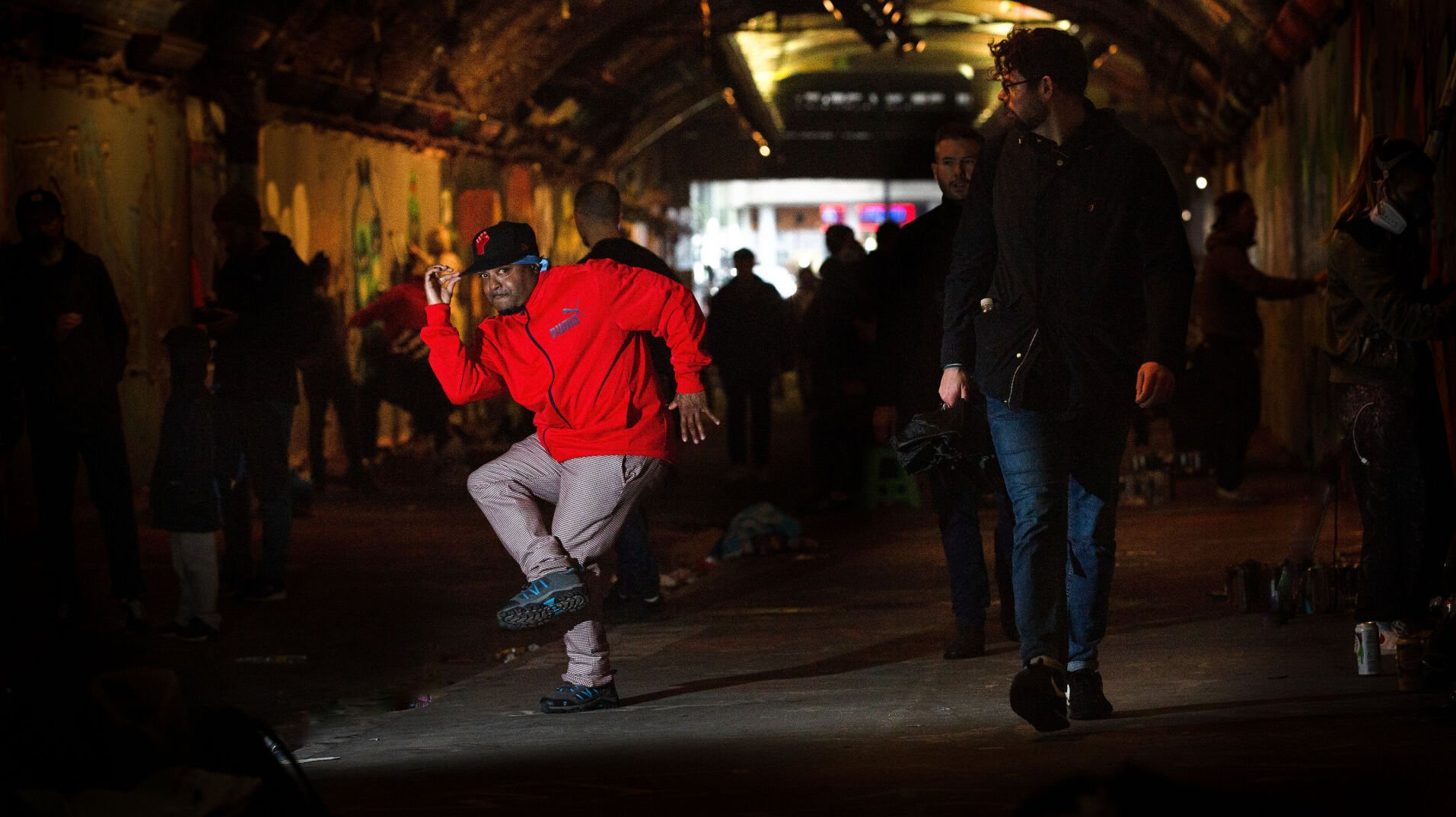Share post
The need for conversations, understanding, accountability and action
Over the next month we are going to be our code of conduct, the safeguarding policies and whistleblowing policies.
Suggestions are welcome through social media (there will be active questions on the Instagram account), email, and join us on Sunday's on the zoom meetings to include your voice.
Below are the current policies up for review. Take a read, get in touch and join us for free Safeguarding training approved by the NSPCC, Ann Craft Trust and public bodies. Keep an eye on social media of how to book.

The current policies (how do these need to change?
GENERAL Code of Conduct Across the Sport:
1. Introduction
This document is The UK Breakin’ National Governing Body LTD’s, known as UK Breakin’s code of conduct, which offers guidance on good practice for everyone involved in the sport of Breakin’, whether they be The UK Breakin’ National Governing Body LTD staff, individual members, coaches, member club officials or volunteers.
The The UK Breakin’ National Governing Body LTD expects all employees to comply with rules and regulations and to conform to The UK Breakin’ National Governing Body LTD code of conduct at all times. If these rules are disregarded or the employee behaves wrongly in some other way The UK Breakin’ National Governing Body LTD may discipline employees. Disciplinary action can consist of formal verbal warning, written warning, a final written warning, and dismissal or, in the case of gross misconduct, summary dismissal.
The code of conduct is divided into four sections:
· Rights: which outlines the basic rights of individuals to take part in the sport, art and community activity of Breakin’.
· Relationships: which offers guidance on personal relationships in Breakin', in particular those between coaches, or others in positions of influence and agreements.
· Personal Standards: which outlines the standards of personal conduct and behaviour expected within Breakin' at all levels.
· Professional Standards: which details the commitment to best practice and ongoing professional development expected of officials, coaches, volunteers and all members within The UK Breakin’ National Governing Body LTD.
2. Rights
It is essential that all people involved in Breakin’ recognise and ensure that everyone has an equal right to participate in the sport.
Issues
The UK Breakin’ National Governing Body LTD member clubs, members, staff, coaches, officials and volunteers should:
· Make every effort to make Breakin’ a sport where everyone is treated as an individual and which is open and available equally to all members of society.
· Make every effort to ensure that Breakin’ in all its forms offers the individual the opportunity to participate without fear or harassment. Where a participant experiences fear, harassment or bullying, the individual has a right to make a complaint and for that complaint to be heard and acted upon in accordance with the relevant policy
· Respect the right of individuals to consult with other coaches and experts.
· Encourage everyone to have a balanced lifestyle, therefore protecting their welfare both outside and within the sport.
Actions
The UK Breakin’ National Governing Body LTD’s member clubs, members, staff, coaches, officials and volunteers should:
· Ensure that all individuals in Breakin’ are, at all times, treated with respect.
· Not discriminate against an individual or groups for any reason, whether it is race, colour, gender, marital status, sexuality, age, disability, occupation, religion, class, or political persuasion
· Challenge discrimination in whatever forms it takes.
· Always behave with discretion when discussing individuals, athletes or coaches and avoid engaging in descriptions or publicly criticising them in a way which they may find demeaning.
· Communicate with each other in a way which reflects respect and care.
3. Relationships
The UK Breakin’ National Governing Body LTD’s member clubs, members, coaches, staff, officials and volunteers should build relationships within the sport which are open and honest and founded on mutual trust and respect.
Issues
· Members, coaches, staff, officials and volunteers must not behave in any way which involves or could be construed as abuse of any kind, whether it is sexual, physical, emotional, neglectful or bullying. The welfare and best interests of everyone involved with the sport should be respected and promoted at all times. Individuals should be empowered to be responsible for their own decisions.
· Members, coaches, staff, officials and volunteers must always take action if they have concerns about an adult‘s behaviour towards a child.
· When coaching is offered, it is important to clearly define the level of expertise, services and any fees involved.
Actions
If a relationship is developing between a coach and an athlete they are coaching, then the athlete should immediately be transferred to another coach. It is the duty of coaches and other The UK Breakin’ National Governing Body LTD officials to know and understand The UK Breakin’ National Governing Body LTD’s policies and procedures in this regard. It is equally important to follow the reporting procedures laid down by The UK Breakin’ National Governing Body LTD if an individual has a concern – failing to act is not acceptable.
Clubs, Divisions and other forms of association within the sport, should involve and consult members at all levels in decision-making processes. Members, coaches, staff and officials must respect all participant opinions concerning their participation in Breakin’. Equally, participants at all levels should be encouraged to take responsibility for their own development and actions within the sport and be aware of and respect the Technical Regulations under which Breakin’ competitions are conducted. Where decisions are made concerning a participant’s involvement in the sport, whether it be with a coach or other person in a position of responsibility, care must be taken to include the participant in the decision-making process except during competitions when this process is governed by the Technical Regulations.
Coaches or other persons in positions of responsibility should keep participants and/or their parents/guardians informed of the requirements of the sport, both physical and where appropriate, financial. An understanding of the potential for conflicts of interest and a willingness to resolve them is also important.
4. Personal Standards
The UK Breakin’ National Governing Body LTD’s member clubs, members, coaches, staff, officials and volunteers should demonstrate proper personal behaviour and conduct at all times. They must be fair, honest and considerate to participants and other individuals involved in the sport, and must attempt to provide positive role models for others in the sport at all times.
Actions
· It is essential to act within the Technical Regulations and the spirit of Breakin’ at all times and behave with respect, displaying control, dignity and professionalism at all times.
· The UK Breakin’ National Governing Body LTD’s member clubs, members, coaches, staff, officials and volunteers must be prepared to familiarise themselves with issues relating to the use of performance enhancing drugs and banned methods in sport and co-operate fully with UK Sport and The UK Breakin’ National Governing Body LTD policies in this area. Coaches and officials have a responsibility to provide education and guidance on these issues.
· Coaches and clubs should maintain previous levels of interest and support for an athlete when they are injured or sick.
· High standards of behaviour are expected of everyone within the sport, whether it be of language, manner, appearance or punctuality. Quality preparation and presentation are also important aspects of coaching and educational work.
People in positions of authority or influence, or who may be considered role models, should not smoke, drink alcohol or use recreational or performance enhancing drugs whilst involved with the sport or its participants in any way.
5. Professional Standards
To maximise the enjoyment and benefits of sport, minimise the risks to participants and competitors and ensure safe and correct practice, all officials, coaches and others in positions of authority within the sport, must attain a high level of competence through qualifications and a commitment to ongoing training and must support and implement the codes of conduct and policies of The UK Breakin’ National Governing Body LTD.
Issues
The UK Breakin’ National Governing Body LTD’s member clubs, members, coaches, staff, officials and volunteers should strive to provide a safe environment that maximises the enjoyment and benefits of sport and minimises risks to participants and competitors, thus helping them to achieve their goals. Safe and correct practice must be carried out and promoted at all times.
Officials, coaches and others in positions of authority within the sport should at all times strive to be professional and accept responsibility for their actions. They should make an ongoing commitment to provide participants and competitors with a quality service. Beyond that, they should actively promote the positive benefits to society of participation in Breakin’. They should contribute to the development of their own field of expertise or responsibility by exchanging knowledge and ideas with others and by gaining appropriate The UK Breakin’ National Governing Body LTD (or other approved body) qualifications.
Actions
· Member clubs, members, coaches, staff, officials and volunteers should follow The UK Breakin’ National Governing Body LTD’s guidelines.
· Participation in The UK Breakin’ National Governing Body LTD’s competitive events should only go ahead with full observance of the technical regulations governing the sport in general and the individual disciplines within the sport.
· Coaching sessions, in particular, should be progressive and appropriate.
· Clubs and coaches should maintain appropriate records of members and of coached participants. Whenever a coach is advising a participant, they should recognise and accept when it is appropriate to refer them to another coach or specialist.
· Coaches and officials should seek to attain the highest level of qualification available and maintain an up-to-date knowledge and understanding of technical developments within sport, and of other issues which may have an influence their participants or their own professional ability.
· The UK Breakin’ National Governing Body LTD’s member clubs, members, coaches, staff, officials and volunteers should be aware of the social issues and how sport can contribute to local, regional or national initiatives. Every opportunity to recruit people into the sport or to use Breakin’ as an educational tool should be taken.
· Coaches should identify and contribute to initiatives which will improve the standards and quality of coaching, both in Breakin’ and other sports. By operating in an open and transparent fashion with each other, coaches can benefit from shared knowledge and experience.
· When involved in coaching, or any other area of specialist knowledge or expertise, individuals should look to take an analytical approach, including identifying their professional needs. They should be committed to participating in continuous professional development, through both training and experience.
· Anyone engaged in positions of responsibility within Breakin’ should be aware of the need to manage their lifestyle and commitments to the sport, to avoid burn-out, stress or a lowering of standards which may impact on themselves or others.
· It is vital that no one in The UK Breakin’ National Governing Body LTD, at any level, assumes responsibility for any role which they are not qualified or prepared for. Above all, they should not mislead others as to their level of qualification or competence.
6. Miscellaneous
Dress Code
- Appropriate (including culturally appropriate) dress code should be worn depending on the nature of the tasks to be performed. Employees should aim to present a positive and professional image of The UK Breakin’ National Governing Body LTD.
- Variations on the above must be acceptable for employees from different cultural backgrounds.
- If you are provided with a uniform, you are not allowed to wear other clothes, unless specific circumstances apply.
- If you are uncertain about whether something is appropriate, please speak to your line manager.
Mobile Phone usage
- Outgoing or incoming calls on mobile telephones which are of a social nature must be restricted to lunch/break time.
- The use of mobile phones/devices, whether hand-held or hands-free, is not permitted whilst driving a pool vehicle or hire vehicle.
WHISTLE-BLOWING POLICY :
1. Introduction
This whistle-blowing policy has been introduced in response to the Public Interest Disclosure Act 1998 and provides a procedure which enables employees to raise concerns about what is happening at work, particularly where those concerns relate to unlawful conduct, financial malpractice or dangers to the public or the environment. The object of this policy is to ensure that concerns are raised and dealt with at an early stage and in an appropriate manner.
The UK Breakin’ National Governing Body encourages you to bring to its attention alleged wrong-doing and ethical or legal concerns which may impact on the work that we do and anyone involved.
You have a duty to be vigilant and to keep The UK Breakin’ National Governing Body informed of any such matters. This policy is to provide you with a formal channel through which employees and workers of The UK Breakin’ National Governing Body can raise matters of a serious nature relating to The UK Breakin’ National Governing Body. Such matters cannot be raised informally.
We encourage you to disclose information which tends to show one or more of the following where such disclosure relates in some way to The UK Breakin’ National Governing Body:
· that a criminal offence has been committed, is being committed or is likely to be committed;
· that a person has failed, is failing or is likely to fail to comply with any legal obligation to which he or she is subject;
· that a miscarriage of justice has occurred, is occurring or is likely to occur;
· that the health and safety of any individual has been, is being or is likely to be endangered;
· that the environment has been, is being or is likely to be damaged;
· that information tending to show any of the above has been, is being or is likely to be deliberately concealed.
Such disclosures are referred to in this policy as “Disclosures”.
When considering whether a matter falls into any of the above categories, you should bear in mind the rules and regulations to which The UK Breakin’ National Governing Body and its staff are subject. If you make a Disclosure, you must have a reasonable belief that the information you are disclosing is true and you must make the Disclosure in good faith.
How the Whistle-Blowing Policy Differs from the Grievance Procedure
This policy does not apply to raising grievances about an employee’s personal situation. These types of concerns are covered by The UK Breakin’ National Governing Body Grievance Procedures. The Whistle-Blowing Policy is primarily concerned with where the interests of others or The UK Breakin’ National Governing Body itself are at risk. It may be difficult to decide whether a particular concern should be raised under the Whistle-Blowing Policy or under the Grievance Procedure, or under both. If you have any doubt as to the correct route to follow, please seek advice from a director who will be able to advise you accordingly.
2. Method of Disclosure
Disclosures cannot be made informally or anonymously and you should not discuss or raise such matters with your colleagues or your director. If you wish to make a Disclosure you must make it through the formal channel set out in this policy.
The UK Breakin’ National Governing Body has a specified individual to whom Disclosures should be made (the “Appointed Person”). The current Appointed Person is a director. The Appointed Person will act as a co-ordinator to ensure that any Disclosure is referred to an appropriate party for investigation.
As stated above, if you wish to make a Disclosure, you must make it in writing to the Appointed Person unless:-
· the Appointed Person is absent and you reasonably consider that the Disclosure cannot wait until his/her return. In this instance you should make the Disclosure in writing to a director instead;
· the Disclosure relates to or involves the Appointed Person in any way, in which case you should make the Disclosure in writing to a director instead.
3. Procedure following Disclosure
After you have made a written Disclosure, the Appointed Person will write to you acknowledging receipt of the Disclosure and to arrange a meeting with you. The written acknowledgement will normally be sent to you within 2 working days of the Disclosure and the meeting will usually take place within 5 working days of the Disclosure.
The purpose of the meeting will be to enable the Appointed Person to obtain full details of the matter to enable him/her to conduct a preliminary investigation to establish whether the Disclosure is well founded and, if so, to whom the Disclosure should be referred for investigation. At this meeting you will be asked to identify any other individuals with knowledge of the matter, who may also need to be interviewed.
Your role is to raise a matter which may be of concern to The UK Breakin’ National Governing Body. The scope of the preliminary investigation carried out by the Appointed Person is to be determined by the Appointed Person him/herself.
At the end of the preliminary investigation, the Appointed Person will have a further meeting with you to inform you of the outcome and whether any further investigations are to be undertaken and by whom.
If the Appointed Person concludes that your Disclosure is not well founded, no further investigation will be carried out under this procedure. This decision will be final and will not be reviewed unless further evidence is produced in relation to the Disclosure.
If the Appointed Person considers that your Disclosure is well founded, he/she will assess who is best placed to carry out further investigations and will refer the matter accordingly.
4. Further Investigations
If the Appointed Person considers that further investigations are required, the matter will be referred to the most appropriate and relevant person to conduct the investigations (the “Investigator”). Once again, the Investigator will not be investigating the Disclosure on your behalf, but on behalf of The UK Breakin’ National Governing Body. The Investigator will determine the method and scope of the investigations. The Investigator may need to meet with you in order to obtain further information.
The Investigator will prepare a written report outlining the extent of the investigations and setting out his/her conclusions and/or any recommendations. A copy of this report will be provided to the Appointed Person.
The Appointed Person and the Investigator will have a meeting with you, after the report has been finalised, to inform you of the outcome of the further investigations. You will not be entitled to keep a copy of the report.
The conclusion of the Investigator is final. You have no right of appeal. The Investigator, with assistance from the Appointed Person, will be responsible for ensuring that any recommendations in the report are referred to the correct channels for implementation.
5. Time Periods
All or any of the time periods set out in this policy may need to be varied in certain circumstances. If this is the case, the Appointed Person will inform you of this during the course of the procedure and advise you of the revised timescale.
6. Confidentiality
The Appointed Person and the Investigator will keep your Disclosure, and the fact that you are the source of the Disclosure, as confidential as possible and will only inform individuals that need to know. These individuals may include, but will not necessarily be limited to, the alleged wrongdoer(s), others named by you when making the Disclosure and any witnesses or other individuals who can provide further information in relation to the Disclosure.
You must treat the Disclosure with the utmost confidence. You must not discuss the Disclosure with any third party other than the Appointed Person, the Investigator and, if you have one and consider it appropriate to consult him or her, your legal advisor. You must not attempt to carry out your own investigation.
7. Victimisation and/or Malicious Disclosures
The UK Breakin’ National Governing Body will make every effort to ensure that you suffer no adverse repercussions as a result of making a Disclosure. Any allegation of victimisation of an individual who has made a Disclosure will be taken very seriously and anyone found to be victimising such a person will be subject to disciplinary action, up to and including dismissal.
Any individual who is found to be making a Disclosure in bad faith or maliciously however will be subject to disciplinary action, up to and including dismissal.
8. Records
The Appointed Person will maintain notes of meetings, reports, recommendations and all other documents relating to Disclosures made under this policy. Such documents will be kept confidentially.
9. Revision of Policy
This policy is not intended to be contractually binding. The UK Breakin’ National Governing Body reserves the right to amend and/or withdraw this policy from time to time for any reason, including without limitation, to take account of changes in the law, best practice and/or operational requirements.
Safeguarding children and vulnerable adults policy :
1. POLICY STATEMENT
The aim of this policy is to ensure that children, young people, and vulnerable adults are protected during activities and services provided by the UK Breakin’ National Governing Body. In the course of their work, staff may come into contact with children, young people and potentially vulnerable adults.
The UK Breakin’ National Governing Body is committed to practices which promote the welfare of participants and protects them from harm. We wish to ensure that all activities under our control take place in a safe and enjoyable environment in which participants can learn and feel valued.
We will take every reasonable step to ensure that workshop participants are protected from any abuse i.e. physical, emotional, sexual, or neglect.
We will ensure that all staff accept and recognise their responsibilities in safeguarding the children and vulnerable adults they are working with.
2. PRINCIPLES
We believe that:
· The welfare of the child, young person and vulnerable adult is paramount.
· All children, young people and vulnerable adults regardless of age, culture, disability, gender, language, racial origin, religious beliefs and/or sexual identity have a right to protection from abuse.
· All suspicions and allegations of abuse should be taken seriously and responded to swiftly and appropriately.
· We will not tolerate any form of abuse wherever it occurs or whoever is responsible.
· We are committed to promoting an atmosphere of inclusion, transparency and openness, and are open to feedback from people who use our services, carers, advocates or staff with a view to how we may continuously improve our services.
We will endeavour to safeguard children and vulnerable adults by:
· Adhering to our safeguarding children and vulnerable adult policy and ensuring that it is supported by robust procedures.
· Carefully following the procedures laid down for the recruitment and selection of staff in line with our Equal Opportunities Policy.
· Providing effective management for staff through supervision, support and training.
· Implementing clear procedures for raising awareness of and responding to abuse within UK Breakin’ and for reporting concerns to statutory agencies that need to know.
· Ensuring general safety and risk management procedures are adhered to, in line with our Health and Safety Policy.
· Promoting full participation and having clear procedures for dealing with concerns and complaints.
· Managing personal information, confidentiality and information sharing.
· Safeguarding children and vulnerable adults by implementing a code of behaviour for all involved with The UK Breakin’ National Governing Body, including partner organisations.
3. RECRUITMENT OF STAFF
All applicants for employment with The UK Breakin’ National Governing Body will be asked to declare unspent convictions. They will also be told that if the role will involve contact with children or vulnerable adults, a DBS check will be a condition of employment.
When the work role will involve contact with vulnerable adults, employment application forms will include a requirement to disclose any allegations or criminal action of abuse against a vulnerable adult. Failure to disclose information will be regarded as gross misconduct.
Staff whose role will involve regular one-to-one contact with children or vulnerable adults will be required to agree to a DBS check before beginning their role.
4. CODE OF BEHAVIOUR
Good Practice Guidelines
· Always work in an open environment.
· Avoid private or unobserved situations and encourage open communication with no secrets.
· Act as a good role model and treat all children, young people and vulnerable adults with respect and dignity, recognising any unique personal needs.
· Where possible, ensure that someone in authority e.g. from the school/educational establishment, youth organisation or community group, is present at workshops or other events.
· Maintain a safe environment and appropriate distance from participants and only engage in physical contact when necessary.
· Keep a written record of any injury that occurs, along with details of any treatment given.
Practices Never To Be Sanctioned
Staff or should never:
· Engage in rough, physical or sexually provocative games including horseplay.
· Allow or engage in any form of inappropriate touching.
· Make sexually suggestive comments to a child, young person or vulnerable adult even in fun.
· Invite or allow children, young people or vulnerable adults to stay with them in their accommodation.
· Reduce a child, young person or vulnerable adult to tears as a form of control. Allow allegations made by a participant to go unrecorded or not acted upon (reported in line with reporting procedure).
Appropriate touching is physical contact which is either;
· Essential for the purposes of teaching/instructing. When this is necessary it should be explained to ensure that participants are comfortable with this contact.
· Essential to keep the participant safe and or prevent injury.
This should always be the minimal contact necessary.
Inappropriate touching involves all forms of unnecessary physical contact which is not appropriate.
5. PROCEDURE IN THE EVENT OF A DISCLOSURE
This procedure must be followed whenever an allegation is made that a child or vulnerable adult has been abused or when there is a suspicion that a child or vulnerable adult has been abused. All complaints, allegations or suspicions must be taken seriously.
Promises of confidentiality should not be given as this may conflict with the need to ensure the safety and welfare of the child/vulnerable adult.
A full record shall be made as soon as possible of the nature of the allegation and any other relevant information. This should include information as follows:
· Name of the complainant and, where different, the name of the child/vulnerable adult who has allegedly been abused.
· Your name and the names of others present.
· Date and time of alleged abuse.
· Location where the alleged abuse occurred.
· A description of any injuries observed
· The nature of the alleged abuse.
· The account which has been given of the allegation.
Responding to an Allegation
Any suspicion, allegation or incident of abuse must be reported to a board member on that working day where possible.
The board member shall telephone and report the matter to the appropriate local social services department duty social worker. A written record of the date and time of the report shall be made and the report must include the name and position of the person to whom the matter is reported. The telephone report must be confirmed in writing to the relevant local authority Social Services department within 24 hours.
Responding appropriately to a child/vulnerable adult making an allegation of abuse
· Stay calm.
· Listen carefully to what is said.
· Find an appropriate early opportunity to explain that it is likely that the information will need to be shared with others – do not promise to keep secrets.
· Tell the child/vulnerable adult that the matter will only be disclosed to those who need to know about it.
· Allow the child/vulnerable adult to continue at her/his own pace.
· Ask questions for clarification only, and at all times avoid asking questions that suggest a particular answer.
· Reassure the child/vulnerable adult that they have done the right thing in telling you.
· Tell them what you will do next, and with whom the information will be shared.
· Record in writing what was said, using the child’s/vulnerable adult’s own words as soon as possible – note the date, time, any names mentioned, to whom the information was given and ensure that the record is signed and dated.
It is important to remember that the person who first encounters a case of alleged abuse is not responsible for deciding whether abuse has occurred. That is a task for the professional child protection agencies, following a referral from a board member.
Confidentiality
UK Breakin' has a professional responsibility to share relevant information about the protection of children & vulnerable adults with other professionals, particularly investigative agencies.
All personal information regarding a child/vulnerable adult will be kept confidential except when; it is suspected that a child/vulnerable adult is the victim of abuse.
Allegations against Staff / Associates
If a complaint or allegation of abuse is made against a member of staff, the Directors will be immediately informed of the allegation and the disciplinary process will be dealt with in confidence in accordance with the Data Protection Act 1998.
If the allegation is unsubstantiated, the staff member/Associate should be given support to integrate into UK Breakin' and resume their post/role.
If the allegation is substantiated and the staff member/Associate has been found to have harmed or put at risk of harm a child or vulnerable adult, UK Breakin' will be under statutory duty to refer the staff member/Associate to the Independent Safeguarding Authority.
If the alleged abuse took place at a project based in a school, community or youth group we would expect the head teacher or director to follow standard procedures and notify social services who can investigate the matter further. If the client/venue does not have procedures in place to deal with allegations of abuse, it would be the responsibility of UK Breakin’ to inform social services.
Share post







